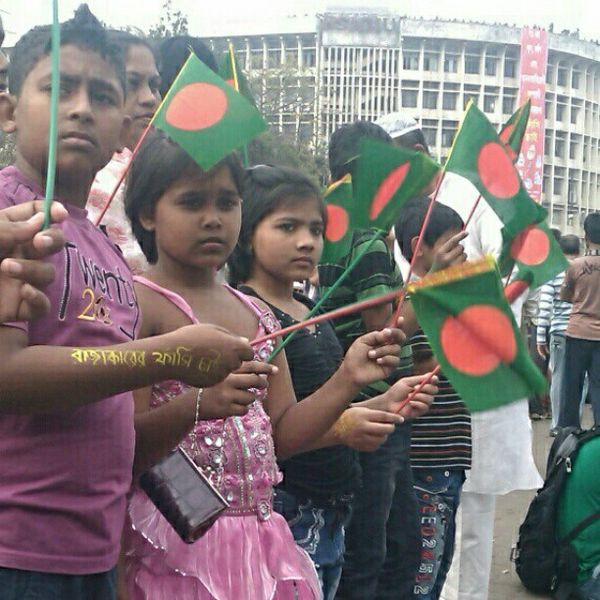 |
| Children wave flags during the Shahbag protests of 2013. (Image: Wiki Commons) |
By Alexandra Stark
The rising tide of Islamist violence in Bangladesh could be a bellwether for South Asia. How should the world respond?
There’s a rising tide of political violence in Bangladesh — one that has gone mostly unnoticed by scholars and analysts. Yet the country presents both a potential threat, as violence by fundamentalist Islamist groups rises, and a prospective model for a democratic, majority-Islamic state. As a battleground over the role of Islam and politics, Bangladesh will be a crucial proving ground for those who see Islam as an inspiration for development, democracy, and peaceful social relations—and those with a fundamentalist vision for society who want to export terrorism to neighboring India, Pakistan, and Afghanistan. As a potential bellwether for South Asia more broadly, Bangladesh deserves a second look.
The third largest Muslim country in the world, Bangladesh has a national identity stemming from a heritage of moderate Sunni Islam and a historical tradition of tolerance and pluralism. With a per capita income of just $1,080, Bangladesh is ranked among the poorest countries in the world, yet it has sustained a democratic tradition since independence (although interspersed with several military coups). Bangladesh’s blend of moderate Islam with a secular-oriented, democratic state could serve as a model for the region.
Yet Bangladesh is also threatened by a rising tide of radical Islamist violence that has its roots in both the struggle for independence and a more recent wave of radicalized violence. For a relatively small diplomatic investment, the international community could help to deny radical Islamist groups a safe haven in South Asia and preserve a moderate Islamic democracy, by encouraging a negotiated settlement between the main political parties, working with the government of Bangladesh to root out terrorist organizations before they are able to metastasize, and providing protection for progressive media voices that are increasingly being targeted by terrorists.
Read the full story at The Diplomat
